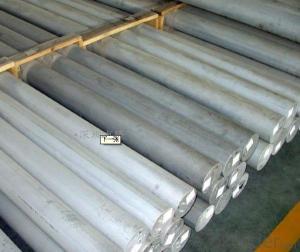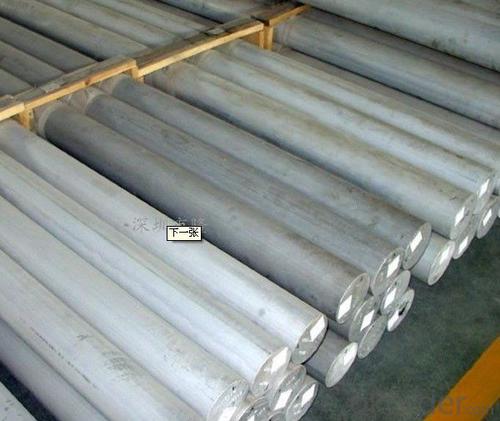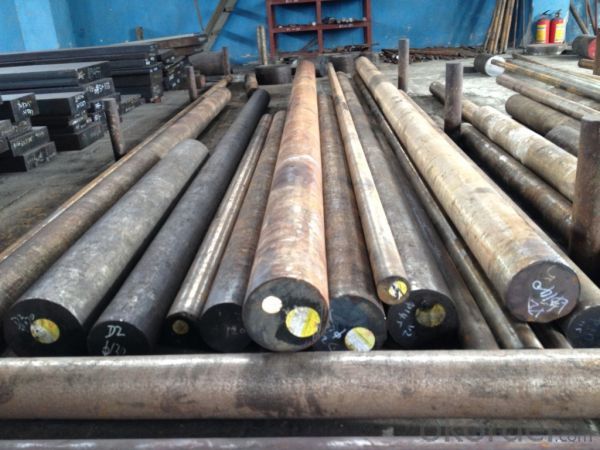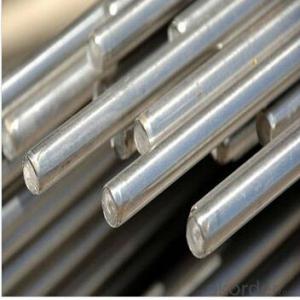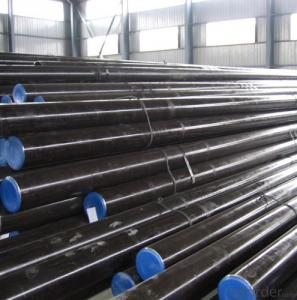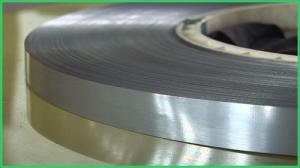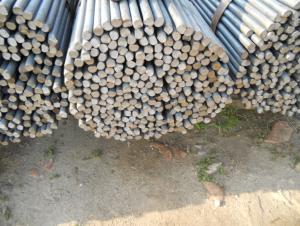Spring Special Steel Round Bar
- Loading Port:
- China Main Port
- Payment Terms:
- TT or LC
- Min Order Qty:
- -
- Supply Capability:
- -
OKorder Service Pledge
OKorder Financial Service
You Might Also Like
Product Description:
OKorder is offering Spring Special Steel Round Bar at great prices with worldwide shipping. Our supplier is a world-class manufacturer of steel, with our products utilized the world over. OKorder annually supplies products to European, North American and Asian markets. We provide quotations within 24 hours of receiving an inquiry and guarantee competitive prices.
Product Applications:
Spring Special Steel Round Bar are ideal for structural applications and are widely used in the construction of buildings and bridges, and the manufacturing, petrochemical, and transportation industries.
Product Advantages:
OKorder's Spring Special Steel Round Bar are durable, strong, and resist corrosion.
Main Product Features:
· Premium quality
· Prompt delivery & seaworthy packing (30 days after receiving deposit)
· Corrosion resistance
· Can be recycled and reused
· Mill test certification
· Professional Service
· Competitive pricing
Product Specifications:
Manufacture: Hot rolled
Grade: Q195 – 235
Certificates: ISO, SGS, BV, CIQ
Length: 6m – 12m, as per customer request
Chemical Composition:
C | Mn | Si | Cr |
0.65~0.75 | 0.40~0.60 | 1.40~1.70 | 0.20~0.40 |
S | P | Ni | |
≤0.030 | ≤0.030 | ≤0.030 |
FAQ:
Q1: Why buy Materials & Equipment from OKorder.com?
A1: All products offered byOKorder.com are carefully selected from China's most reliable manufacturing enterprises. Through its ISO certifications, OKorder.com adheres to the highest standards and a commitment to supply chain safety and customer satisfaction.
Q2: How do we guarantee the quality of our products?
A2: We have established an advanced quality management system which conducts strict quality tests at every step, from raw materials to the final product. At the same time, we provide extensive follow-up service assurances as required.
Q3: How soon can we receive the product after purchase?
A3: Within three days of placing an order, we will begin production. The specific shipping date is dependent upon international and government factors, but is typically 7 to 10 workdays.
Q4: What makes stainless steel stainless?
A4: Stainless steel must contain at least 10.5 % chromium. It is this element that reacts with the oxygen in the air to form a complex chrome-oxide surface layer that is invisible but strong enough to prevent further oxygen from "staining" (rusting) the surface. Higher levels of chromium and the addition of other alloying elements such as nickel and molybdenum enhance this surface layer and improve the corrosion resistance of the stainless material.
Q5: Can stainless steel rust?
A5: Stainless does not "rust" as you think of regular steel rusting with a red oxide on the surface that flakes off. If you see red rust it is probably due to some iron particles that have contaminated the surface of the stainless steel and it is these iron particles that are rusting. Look at the source of the rusting and see if you can remove it from the surface.
Images:
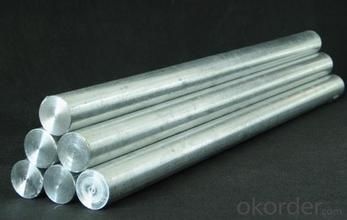
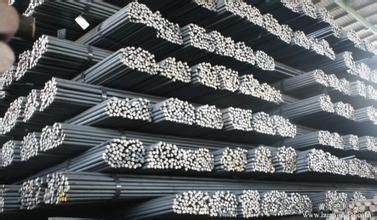
- Q: Can steel round bars be used in the manufacturing of cylinders?
- Certainly, cylinders can be manufactured using steel round bars. Steel round bars are widely utilized across industries such as automotive, aerospace, and manufacturing owing to their exceptional strength and durability. When it comes to constructing the cylindrical body of a cylinder, steel round bars serve as an ideal material choice. The steel round bars can be shaped through machining, forging, or rolling, and subsequently joined together through welding or fastening to create the cylindrical structure. By employing steel round bars, the resulting construction guarantees robustness and stability, both of which are crucial for the secure and effective operation of cylinders in diverse applications.
- Q: How to determine the welding seam height of steel plate and steel bar?
- If the arc surface in the length direction of the steel bar is lapped welded with the steel plate surface, the gap between the steel plate and the round bar is welded by the 2 side welding angle, so that the welded meat is equal to the largest diameter of the round steel arc surface.
- Q: What are the advantages of using copper-alloy steel round bars?
- There are several advantages to using copper-alloy steel round bars. Firstly, the copper content in the alloy enhances the material's corrosion resistance, making it suitable for applications in harsh environments or exposed to moisture. Secondly, the combination of copper and steel results in improved strength and durability, allowing the round bars to withstand heavy loads and high-stress conditions. Additionally, copper-alloy steel round bars offer excellent thermal conductivity, making them ideal for applications where heat transfer is necessary. Lastly, copper-alloy steel round bars are relatively easy to machine and fabricate, providing versatility in various industries such as construction, manufacturing, and engineering.
- Q: What are the typical tolerances for steel round bars?
- The typical tolerances for steel round bars can vary depending on the specific requirements of the application or industry. However, there are generally accepted standard tolerances that are commonly used. For diameter, the typical tolerances for steel round bars are usually within a few thousandths of an inch. This means that the actual diameter of the bar can deviate slightly from the specified diameter, but it will still fall within an acceptable range. In terms of straightness, steel round bars are commonly produced with a straightness tolerance that allows for some deviation from a perfectly straight line. The typical tolerance for straightness is usually measured in units of inches per foot or millimeters per meter. This means that the bar may have a slight bend or curve, but it should not exceed the specified tolerance. Surface finish is another important aspect of steel round bars. The typical tolerance for surface finish is usually specified in terms of roughness average (Ra) or surface roughness in micrometers. This tolerance ensures that the surface of the bar is smooth and free from any significant imperfections, such as pits or scratches. It is important to note that these typical tolerances can vary depending on the specific grade or type of steel being used, as well as the intended application. In some cases, tighter tolerances may be required for precision or critical applications, while looser tolerances may be acceptable for less demanding applications. Therefore, it is always recommended to consult the relevant industry standards or specifications to determine the specific tolerances required for a particular steel round bar.
- Q: What are the advantages of using phosphorus-alloy steel round bars?
- There are several advantages of using phosphorus-alloy steel round bars: 1. Increased strength: Phosphorus-alloy steel round bars have a higher tensile strength compared to standard steel bars. This increased strength makes them suitable for applications that require greater load-bearing capacity, such as construction and automotive industries. 2. Enhanced corrosion resistance: Phosphorus-alloy steel has a higher resistance to corrosion compared to regular steel. This makes it more durable and long-lasting, especially in environments with high moisture or exposure to chemicals. 3. Improved machinability: Phosphorus-alloy steel has excellent machinability, which means it can be easily shaped, cut, and formed into various designs or structures. This characteristic makes it a preferred choice for industries that require precise shaping, such as manufacturing and engineering. 4. Reduced brittleness: Phosphorus-alloy steel has a lower brittleness factor compared to other types of steel. This means it is less likely to break or fracture under sudden impact or stress, making it a safer option for applications where structural integrity is crucial. 5. Cost-effective: Despite its enhanced properties, phosphorus-alloy steel round bars are still cost-effective compared to other specialty alloys. This makes them a more affordable choice for industries that require high-performance materials without breaking the budget. 6. Improved weldability: Phosphorus-alloy steel round bars have excellent weldability, allowing for easy and secure welding connections. This characteristic makes them suitable for applications that require strong and reliable welded joints, such as construction or fabrication projects. In summary, phosphorus-alloy steel round bars offer increased strength, enhanced corrosion resistance, improved machinability, reduced brittleness, cost-effectiveness, and improved weldability. These advantages make them a preferred choice for various industries where high-performance materials are required.
- Q: What is the difference between a ground and a polished steel round bar?
- The surface finish and appearance of a ground steel round bar and a polished steel round bar differentiate them from each other. To achieve a smooth and even surface finish, a grinding process is applied to a ground steel round bar. This involves the use of a grinding wheel or belt to remove any surface imperfections like roughness or irregularities. Ground steel round bars are commonly employed in applications that require precision and tight tolerances, such as in machinery or automotive components. On the contrary, a polishing process is used to create a high shine and reflective surface on a polished steel round bar. This process involves the use of abrasive materials like polishing compounds or buffing wheels. It enhances the aesthetics of the steel bar, making it visually appealing. Polished steel round bars find frequent use in decorative applications, architectural projects, or industries where a visually pleasing appearance is desired, such as jewelry or interior design. In conclusion, the surface finish is the key differentiating factor between ground and polished steel round bars. Ground steel round bars prioritize precision and smoothness, whereas polished steel round bars prioritize a shiny and reflective appearance.
- Q: What is the average cost of steel round bars?
- The average cost of steel round bars can vary depending on various factors such as the size, grade, and market conditions. Generally, the price of steel round bars ranges from $0.50 to $5 per pound. However, it is important to note that these prices are approximate and can fluctuate based on the specific requirements and location of the purchase. Additionally, additional costs such as transportation, processing, and any applicable taxes should also be considered when determining the overall cost. It is recommended to consult with local suppliers or conduct market research to obtain the most accurate and up-to-date information on the average cost of steel round bars in your specific region.
- Q: What are the tolerance levels for steel round bars?
- Tolerance levels for steel round bars vary depending on the specific application and industry standards. Steel round bars are typically produced with tight dimensional tolerances to ensure their precise diameter, straightness, and surface finish. Common tolerance levels for steel round bars include diameter tolerances, straightness tolerances, and surface finish tolerances. Diameter tolerances specify the acceptable range of deviation from the nominal diameter of the round bar. This tolerance is usually expressed as a plus or minus value, such as +/- 0.005 inches. The specific tolerance will depend on the size and type of steel round bar being produced, as well as the requirements of the application. Straightness tolerances refer to the allowable amount of deviation from a perfectly straight line along the length of the round bar. This tolerance is typically expressed in terms of the maximum distance between the round bar and a straight edge placed along its length. For example, a straightness tolerance of 0.030 inches per foot means that a one-foot section of the round bar can deviate up to 0.030 inches from a straight line. Surface finish tolerances specify the acceptable level of imperfections or irregularities on the surface of the round bar. This tolerance is often expressed in terms of roughness average (Ra) or roughness peak (Rz) values. The specific tolerance will depend on the desired surface finish and the application requirements. It is important to note that tolerance levels may also be subject to industry-specific standards, such as those set by organizations like the American Society for Testing and Materials (ASTM) or the International Organization for Standardization (ISO). These standards provide guidelines and specifications for various steel products, including round bars, to ensure consistent quality and performance. Ultimately, determining the tolerance levels for steel round bars involves considering the specific application requirements, industry standards, and the capabilities of the manufacturing process.
- Q: What is the difference between hot rolled and cold rolled steel round bars?
- The main difference between hot rolled and cold rolled steel round bars lies in the process of production. Hot rolled steel round bars are formed by heating the steel above its recrystallization temperature and then rolling it into the desired shape. This process makes the steel more malleable and ductile, resulting in a rougher surface finish. On the other hand, cold rolled steel round bars are formed by rolling the steel at room temperature. This process produces a smoother surface finish and tighter dimensional tolerances, but it also makes the steel less malleable. Overall, the choice between hot rolled and cold rolled steel round bars depends on the specific application and desired characteristics of the end product.
- Q: What are the common defects found in steel round bars?
- Some common defects found in steel round bars include surface cracks, internal voids or inclusions, dimensional variations, and improper heat treatment. Other defects may include decarburization, surface scaling, or surface pitting. These defects can affect the mechanical properties and performance of the steel bars, potentially leading to reduced strength, brittleness, or failure under stress. Regular quality control and inspection processes are necessary to identify and address these defects to ensure the integrity and reliability of the steel round bars.
Send your message to us
Spring Special Steel Round Bar
- Loading Port:
- China Main Port
- Payment Terms:
- TT or LC
- Min Order Qty:
- -
- Supply Capability:
- -
OKorder Service Pledge
OKorder Financial Service
Similar products
Hot products
Hot Searches
Related keywords
